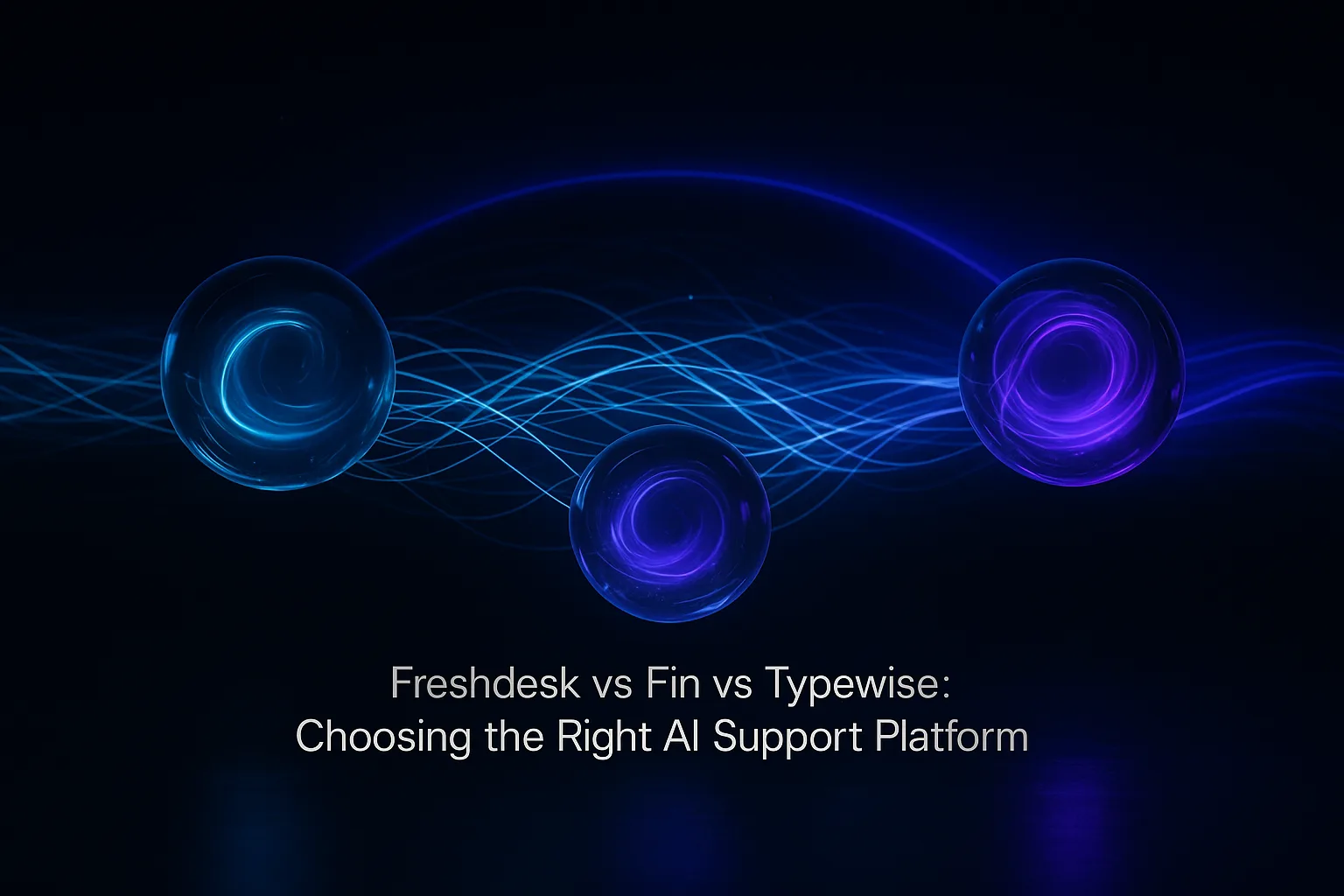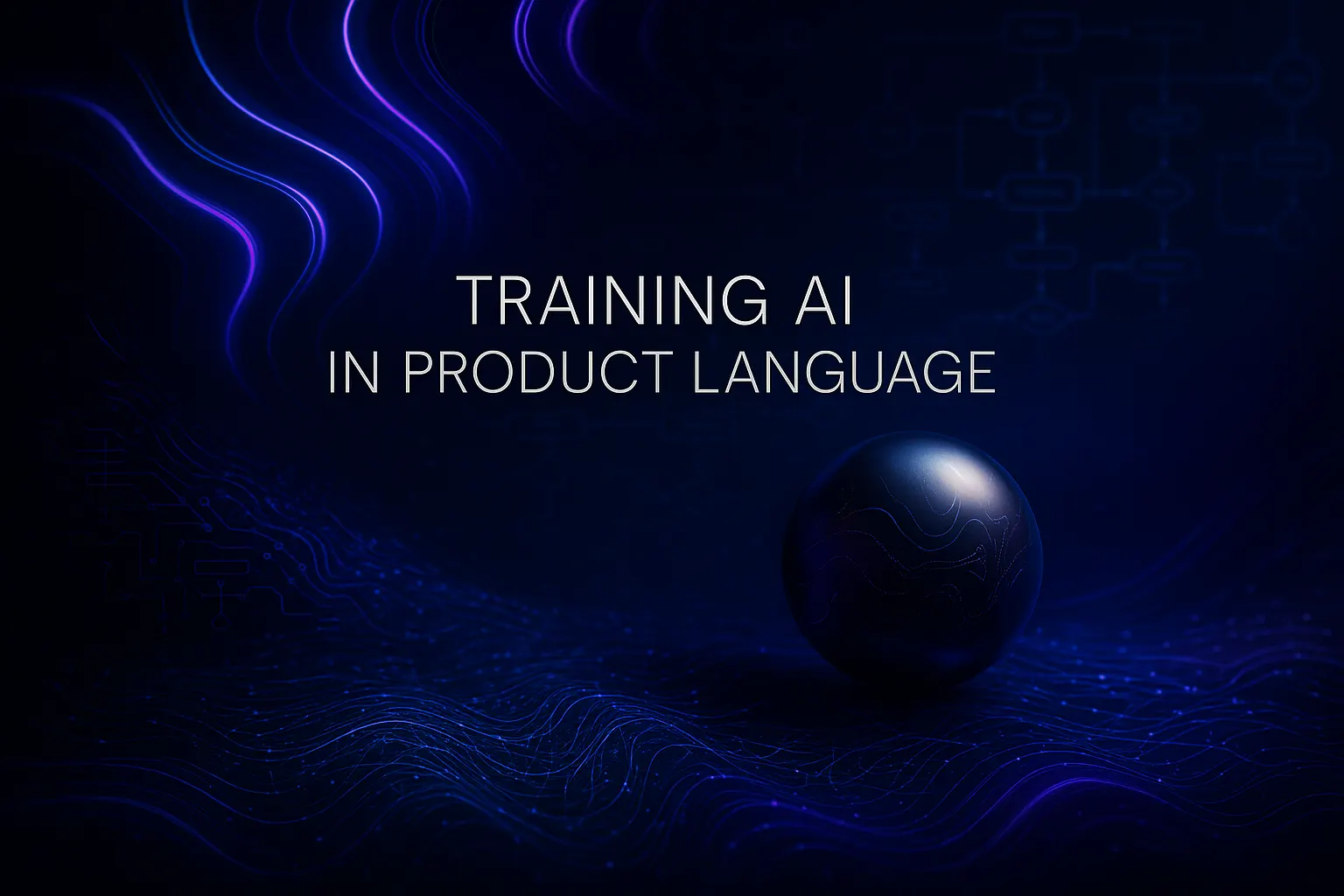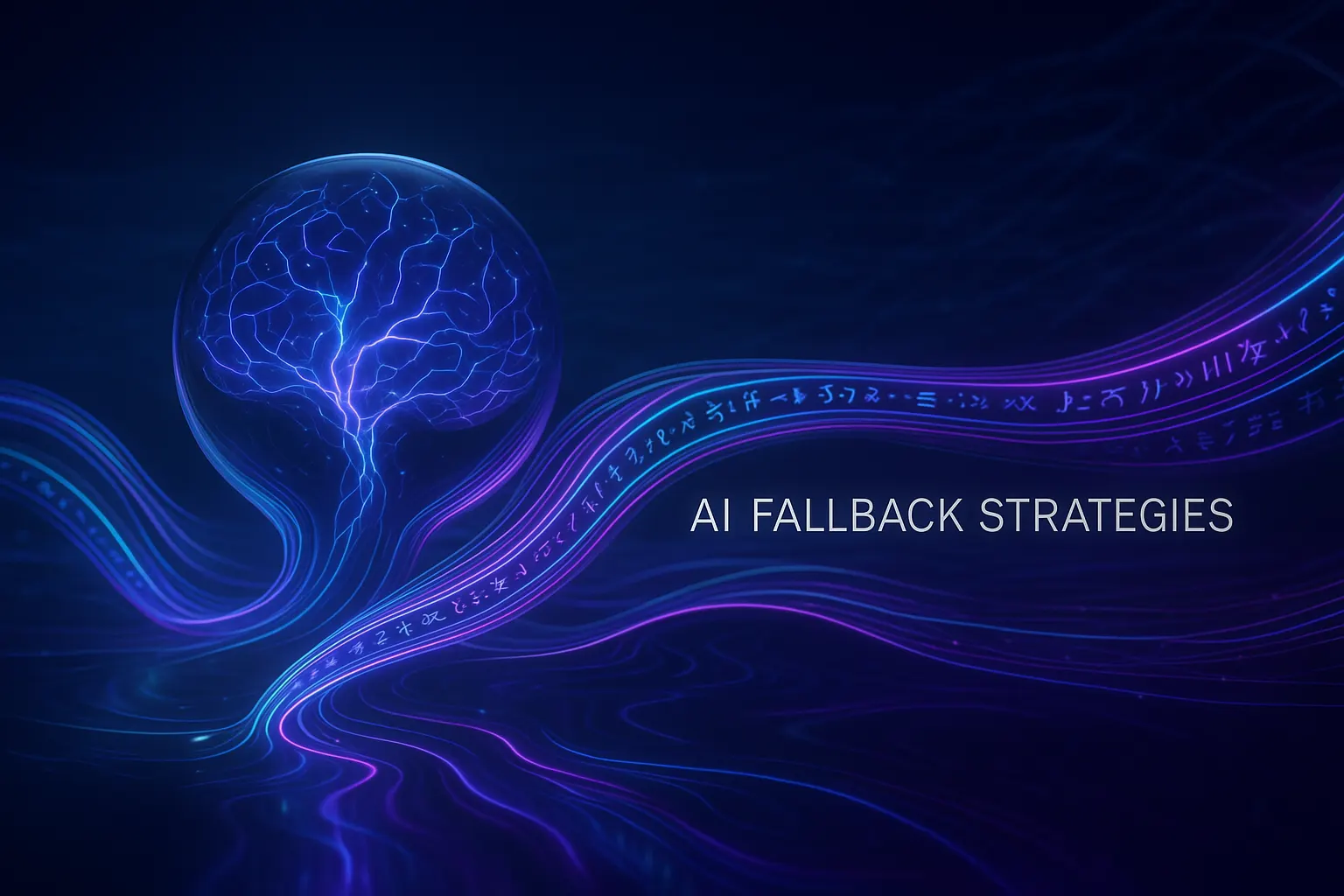Suite, Agent, or Platform? Understanding the Real Choice Between Freshdesk, Fin, and Typewise
Choosing the right AI support platform should go far beyond a simple comparison of features. It’s ultimately a decision about your everyday workflow. Freshdesk, Intercom’s Fin, and Typewise each embody distinct approaches to AI support. Freshdesk is a suite-first solution, offering a comprehensive platform for your AI needs. Intercom’s Fin is chatbot-first, functioning as an AI agent to interact directly with customers. Meanwhile, Typewise is an AI customer service platform that combines an AI Assistant for agents with autonomous AI Agents and orchestration, designed to work inside your existing tools.
This article offers a practical, side-by-side comparison that sheds marketing buzzwords for day-to-day realities, covering ticket management, handoffs, knowledge control, privacy, automation, and total cost.
Freshdesk in Brief: The Suite with Native AI
What it is: Freshdesk is a full-featured helpdesk suite from Freshworks, encompassing ticketing, knowledge bases, SLAs, and automations. Its native AI is integrated into this stack, assisting agents during triage and drafting responses.
Where it shines: Teams that want a single vendor to manage helpdesk, telephony, and self-service elements often begin with Freshdesk. The AI helps with ticket summaries, intent detection, and reply drafting. Unified administration and reporting add convenience for teams.
Tradeoffs: Flexibility often depends on your selected plan and the broader Freshdesk ecosystem. If your operations require multiple CRMs or heavily customized tools, integrations can demand extra planning. There’s also a higher risk of vendor lock-in as more modules are adopted.
Intercom Fin in Brief: The Conversational Front Line
What it is: Fin is Intercom’s AI agent, designed to answer customer questions using your help center and connected information sources. It operates within your website or product, and smoothly hands off to human agents through the Intercom inbox when needed.
Where it shines: Product-led teams that utilize Intercom extensively can expect rapid coverage. Fin efficiently manages common queries, easing queue pressures, and passes nuanced cases to human agents along with full context.
Tradeoffs: Fin’s performance is tied to Intercom’s channels and integrated knowledge model. If your support spans multiple brands or requires complex orchestration with external systems, further setup is likely. Make sure to review pricing and operational guardrails in relation to your ticket mix.
Typewise in Brief: AI Customer Service Platform That Fits Your Stack
What it is: Typewise is an enterprise AI customer service platform that brings three capabilities together: an AI Assistant embedded in your agents’ tools, AI Agents for autonomous case handling across channels (email, chat, and messaging), and an orchestration layer to route requests and enforce your rules. It plugs into 200+ systems and runs within your existing web apps, so teams gain value without disruptive migrations. Typewise emphasizes enterprise-grade security and compliance (ISO 27001, GDPR, EU AI Act) with EU/Switzerland/US data residency options.
Where it shines: Operations leaders who prioritize control and privacy can start with assistive drafting, translation, and style controls, then scale to autonomous flows for high-volume, well-defined requests. Multilingual support and brand-aligned tone help maintain quality at speed.
Tradeoffs: Typewise is not a replacement for a full helpdesk suite; you typically keep your ticketing system and connect Typewise to it. Achieving safe automation requires clear guardrails and process mapping (e.g., approval thresholds, handoff criteria). Outcomes depend on the quality of your knowledge sources and systems integrations.
Head to Head: What Matters Most in Daily Operations
Integration and Workflow Fit
- Freshdesk: Best for those seeking a unified suite to manage most support channels.
- Fin: Ideal if Intercom already serves as your team’s communication and product engagement hub.
- Typewise: Suited for organizations wanting to keep their existing stack and enhance it with AI, both assistive for agents and autonomous where appropriate.
Coverage and Answer Quality
- Freshdesk: Excellent for structured ticketing and knowledge-based responses.
- Fin: Delivers fast web and in-app answers through conversational flows.
- Typewise: Excels at handling complex tickets requiring precise communication, and can automate repetitive flows via AI Agents, including multilingual scenarios.
Control and Compliance
- Freshdesk: Centralized administration with suite-wide policy controls.
- Fin: Compliance and controls are set according to Intercom’s data and content frameworks.
- Typewise: Centers on privacy-by-design, ISO 27001 certification, GDPR and EU AI Act compliance, auditability, and data residency choices.
Cost Model and ROI
Don’t just look at licensing costs. Factor in agent productivity improvements, reduction in ticket deflections, rework rates, legal review time, and required training investments. For real-world ROI potential, read this case study showing a 38% efficiency gain for customer service teams and use similar metrics to create your own payback model.
Time to Value
- Freshdesk: Offers rapid time to value for new suite adopters, but migrating from other tools can slow rollout.
- Fin: Fast deployment for existing Intercom users who maintain a strong help content base.
- Typewise: Quickest for teams staying with their current tools, since agents operate within familiar environments, often live in 1–2 days.
Choose the AI tool that naturally fits your established workflows, not one that forces you to adapt to it.
Which Platform is Right for Which Team?
- Freshdesk is a fit if you want to consolidate vendors and align processes around a single suite. It’s a strong choice for small to mid-sized teams seeking consistent administration and unified metrics.
- Typewise suits teams that need scalable automation and high-quality writing with strict privacy requirements. Keep your CRM, email, chat, and ticketing infrastructure while layering in an AI Assistant for agents and AI Agents for well-defined workflows, all aligned to your brand tone and policies.
- Intercom Fin is optimal when your product is your primary channel and Intercom sits at the core of your customer interaction stack. AI agents handle common issues, escalating only the edge cases, complete with context, to human agents.
These suggestions reflect a typical pattern in the selection process. Your choice may differ. Make sure to map it to the nature of your tech stack and objectives.
A Simple Path to Your Decision
Use the following guidelines to quickly narrow down your options:
- Already using Intercom? Start with Fin. Test answer quality and the handoff process.
- Prefer a comprehensive suite solution? Start with Freshdesk. Explore migration options and reporting features.
- Have a diverse software stack or stringent privacy needs? Start with Typewise. Keep workflows intact, begin with the AI Assistant for drafting and quality, then scale to AI Agents for repetitive, rules-based cases.
Whenever possible, run parallel proofs of concept. Evaluate each on identical tickets and chat interactions. Score tone, accuracy, and reply speed to single out what fits best.
Rollout Checklist for a Low-Risk Pilot
- Define your success metrics, consider FRT, AHT, CSAT, and reopen rates.
- Select three high-volume support intents and three complicated, edge-case scenarios.
- Prepare a verified knowledge base with clear citations for reference.
- Document explicit tone and phrasing rules, providing examples for consistency.
- Allow limited, least-privilege access to test data and define human-in-the-loop thresholds for risky actions.
- Pilot with 10 to 20 agents over a two-week period.
- Measure outcomes such as deflection rates, edits per draft, and instances of legal escalation.
- Use a consistent scorecard to decide on broader rollout, go or no-go.
Verdict
Freshdesk is suited for teams favoring an all-in-one suite with cohesive governance. Fin is strong for Intercom-centric teams demanding fast, efficient web and in-app support. Typewise is the right option where precise writing, privacy, and seamless workflow integration are essential, and where you want the flexibility to add autonomous AI Agents over time. In larger enterprises, it’s common to combine solutions, using a suite for comprehensive ticketing and orchestration-ready assistive/agent AI for quality and speed in agent communications.
Next Step
If your organization values an AI customer service platform that works across your existing tech stack, consider how Typewise can help your agents craft accurate, on-brand responses and automate repetitive cases, without the disruption of platform migration. Start a conversation with Typewise to see how it fits your support workflow.
FAQ
How should I decide between Freshdesk, Typewise, and Fin?
Evaluate your current operational workflow. If integration is key and vendor consolidation appeals, Freshdesk is suitable. Those with complex ticket requirements might find Typewise’s platform advantageous because it pairs an assistive AI with autonomous AI Agents while fitting into existing stacks, whereas Fin is optimal for Intercom-centric environments needing efficient customer interactions.
What are the risks of integrating Freshdesk?
While Freshdesk offers a comprehensive suite, you risk vendor lock-in as you rely on more of their ecosystem. Be cautious of unexpected costs and integration challenges if your setup demands heavily customized solutions across multiple CRMs.
Is Typewise suitable for support teams with high chatbot reliance?
Yes. Typewise provides AI Agents for autonomous case handling across email, web chat, and messaging, alongside its AI Assistant for human agents. Teams with heavy automation needs can implement AI Agents while retaining human-in-the-loop controls for edge cases.
Why might Intercom Fin not be the perfect choice for my team?
While Fin integrates well for existing Intercom users, its efficiency depends heavily on Intercom’s channels and can require additional setup for systems involving multiple brands or intricate processes. Ensure Intercom’s pricing and operational limits align with your team’s specific demands before committing.
What should I consider before migrating to Freshdesk?
The migration to Freshdesk should consider potential disruptions, especially if moving from complex, existing systems. Evaluate the time to value cautiously, as rushing integration might lead to inefficiencies and unmet expectations.
How does Typewise handle privacy requirements?
Typewise is designed for enterprise-grade security: ISO 27001 certification, GDPR and EU AI Act compliance, encryption in transit and at rest, and EU/Switzerland/US hosting options depending on your requirements.
Will the cost models for these tools impact my ROI?
Don’t be misled by surface-level licensing costs; consider the broader impact on agent productivity and compliance savings. Calculate real-world ROI by analyzing improvements in efficiency alongside reductions in rework and legal costs.
What common mistakes should I avoid when piloting these AI solutions?
Avoid oversized pilots; start small to manage risks. Focus pilots on high-impact scenarios, and ensure success metrics are transparent and rigorous to prevent misjudgment and unnecessary escalations during decision making.






